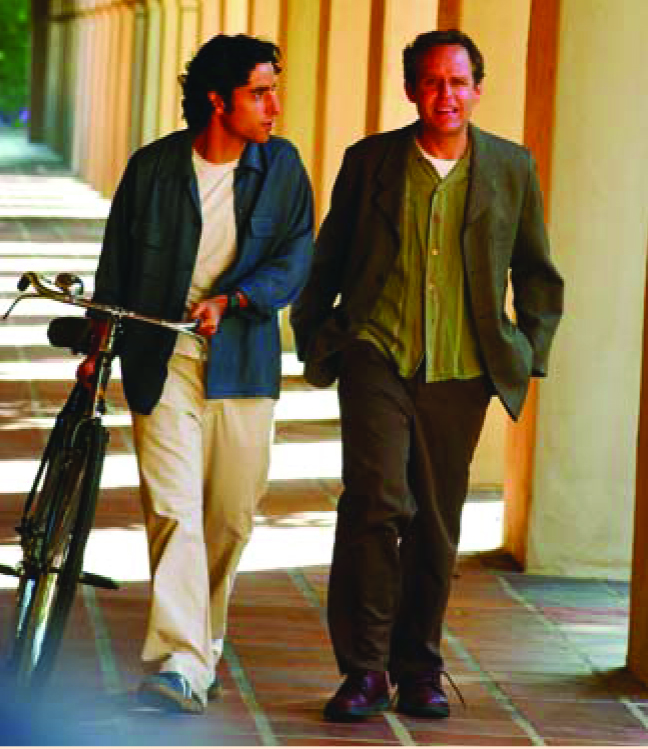TV Series Raises Profile of Science
DOI: 10.1063/1.2138413
In the CBS television series Numb3rs, science is getting a better rap than the usual “mad scientist” so often portrayed on screen. Television shows such as CSI and movies such as A Beautiful Mind have been about scientists, but Numb3rs is unusual in the steps the producers have taken to make sure the science is right.
The series, about a mathematician who helps his FBI-agent brother solve crimes, has proven to be an unexpected hit. Produced by the husband-wife team Nick Falacci and Cheryl Heuton, Numb3rs has just started a 24-episode second season after first being broadcast as a 13-episode mid-season replacement earlier this year.
Falacci and Heuton, both avid readers of popular science books, had been trying to do a series on scientists for years. “Mathematicians and physicists have such an interesting way of looking at the world, and we wanted to deal with that in a narrative structure,” Heuton says. “But with today’s commercial TV, you most likely need to hook [a series] around crime.” The unlikely hero of Numb3rs is Charlie Eppes (played by David Krumholtz), a mathematician based at “CalSci,” a fictionalized Caltech. The character is loosely based on physicist Richard Feynman. In one episode, Eppes uses equations to plot the probable address of a serial rapist. In another, he shows how probability and statistics can reveal the source of a Spanish flu outbreak.
Eppes is helped in his crime solving by astrophysicist Larry Fleinhardt (Peter MacNicol), a character based on several Caltech astrophysicists. “Larry’s office wasn’t seen in the first season as we didn’t have the budget or a good location. … This time around he will be seen more often,” says Heuton. Another link to physics is provided by actor Judd Hirsch, who plays Alan Eppes, Charlie’s father; in real life Hirsch holds a bachelor’s degree in physics.
Scientists were initially skeptical that the show would be accurate, says Falacci, “but once they watched a few episodes and saw we were trying to use real math and real science, we’ve had nothing but support from the community.”
For scientific advice, Heuton and Falacci hired mathematicians Gary Lorden of Caltech and Keith Devlin of Stanford University. Lorden, the main consultant, reviews scripts for scientific accuracy and provides mathematical background, including equations and language typical of ac-ademics. He also puts the producers in touch with economists, physicists, and other scientists.
How the Riemann hypothesis could be used to violate internet security protocols has been the most challenging concept to convey so far, the producers say. “It was a very complex set of ideas to put in a show for a general audience,” says Heuton. The inspiration for the episode came when screenwriter Matt Witten interviewed for a job. “Matt mentioned that he had given a copy of the script to his brother Ed [the physicist],” who, Heuton says, had suggested the Riemann hypothesis to Matt as a theme.
For Lorden, involvement in the show has another Hollywood side: Students sometimes ask for his autograph. Shows like Numb3rs give scientists and engineers more respect among the general public, he says. “I have anecdotal evidence from teachers that teaching 10- to 14-year-olds … is getting a little boost because of the show.” That has not gone unnoticed by the US Department of Defense, which, with an eye toward making science careers more attractive to young people, in August sponsored a workshop organized by the American Film Institute to help scientists sell science-based scripts to Hollywood.
Heuton, for her part, is eager to take the bait: “In the future we would definitely be looking at developing more shows that celebrate rationality, thought, intellectual progress,” she says.

Mathematician Charlie Eppes (played by David Krumholtz, left) and physics professor Larry Fleinhardt (Peter MacNicol) are the faces of science in the TV show Numb3rs.
PARAMOUNT TELEVISION

More about the authors
Paul Guinnessy, American Center for Physics, One Physics Ellipse, College Park, Maryland 20740-3842, US . pguinnes@aip.org





